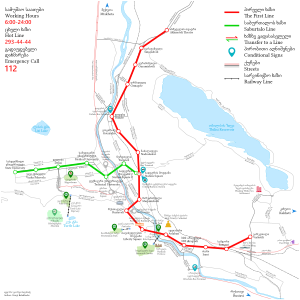Tbilisi Metro
 |
|||
| Overview | |||
|---|---|---|---|
| Native name | თბილისის მეტრო | ||
| Locale | Tbilisi, Georgia | ||
| Transit type | Rapid transit | ||
| Number of lines | 2 | ||
| Number of stations | 22 | ||
| Annual ridership | 96.26 million (2013) | ||
| Website | Tbilisi Transport Company | ||
| Operation | |||
| Began operation | 11 December 1966 | ||
| Operator(s) | Tbilisi Transport Company | ||
| Number of vehicles | 170 | ||
| Train length | 3–4 cars | ||
| Technical | |||
| System length | 27.1 km (16.8 mi) | ||
| Average speed | 33.2 km/h (20.6 mph) | ||
|
|||
The Tbilisi Metro (Georgian: თბილისის მეტროპოლიტენი) is a rapid transit metro system in Tbilisi, Georgia. Opened on 11 December 1966, it was the fourth Metro system in the former Soviet Union. Like most ex-Soviet Metros, most of the stations are very deep and vividly decorated
The Tbilisi Metro comprises two lines, 27.1 kilometres (16.8 mi) in total length, serving 22 stations. In 2012, the Metro transported 93.9 million passengers, a significant increase on the 85.6 million passengers served in 2011. In 2013, the Metro transported 96.26 million passengers. It is operated by the Tbilisi Transport Company, which began operation the same year as the Tbilisi Metro, in 1966.
As of 2012[update], the system consists of two lines, serving 22 stations, operating on 27.1 kilometres (16.8 mi) of route and 62.5 kilometres (38.8 mi) of track. Of the 22 stations, 20 stations are below ground and two are surface level. Of the subterranean stations, 16 are deep level and 4 shallow. The former comprise 6 pylon stations, 5 column and 5 single vaults (built to the Leningrad Technology). The shallow stations consist of three pillar-trispans and one single vault (Kharkov Technology). Due to Tbilisi's uneven landscape, the Metro, particularly the Gldani-Varketili line, has one surface-level section.
...
Wikipedia

